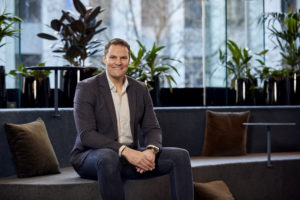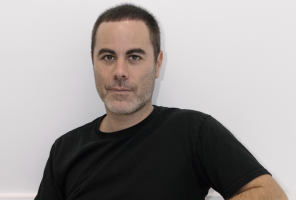If the Reserve Bank of Australia’s taught us nothing else in 2022, it’s that promises and predictions are fraught.
(In case you forgot of didn’t notice, or forgot, for most of 2021 2021, the RBA board and governor Philip Lowe flagged no rate rises for “at least three years” – not until “2024 or later” – as recently as November 2021. This year they hiked rates 8 times – 3% in total.)
But being a startup founder involves a certain degree of optimism and vision, so we asked four founders to have a stab at how they see things panning out for them and their companies over the next 12 months. Here’s what they said. Fingers crossed for all of them
Sam Pratt

Render CEO Sam Pratt
What do you reckon your growth will be like in 2023?
Render has grown its headcount by 30% since July 2022. We’re on track to expand it by another 25% before the end of this financial year.
Those hires will be across both Australia and the US. We may also explore hires in other markets as we explore the viability of expanding further abroad.
Why do you believe your business will grow in spite of tougher conditions predicted for 2023?
We’re growing due to both the funding we received earlier this year and also a demand for our services.
Broadband rollouts continue around the world, with funds that were earmarked for them by government years ago.
For example, just last year, the Biden Administration passed a bill to spend $65 billion on broadband infrastructure across the country.
The challenge now is to deploy these networks as efficiently as possible due to constrained resources and tight timelines. Our software solves this problem, so we’re well placed to captialise on this trend.

Mastt cofounder Jamie Cerexhe
Jamie Cerexhe
Cofounder & Head of Engineering, Mastt
Growth in 2023?
Our base expectation for the next 12 months is a 50-75%+ lift in ARR. That’ll require continued momentum in Australia, along with a bigger uptick in North America and the Middle East where we recently established operations.
Translated into jobs, we’re planning on roughly a 20% lift in headcount, mostly in product development and sales.
Our technology has improved massively in 2022. Which thankfully means scale won’t be a problem for us.
Grow in spite of tougher conditions?
We’re confident because of the sector we operate in.
Our software is used by governments and owners of large capital projects. These infrastructure projects often cost hundreds of millions of dollars (or billions), and they take years to plan & build. So it’s inherently a long-term and steady business segment.
Traditionally it stays relatively insulated during economic downturns. In fact governments often plan for more infrastructure when there’s a recession. Which counter-intuitively can improve the outlook for the sector.

Quad Lock CEO Andrew Poole
Andrew Poole
CEO, Quad Lock
Growth in 2023?
Despite challenging conditions, in 2022 we’ve been able to grow our business significantly as we transitioned out of COVID. we remain very confident that we we can continue this trend into 2023.
This has been in large part to a shift in our strategy post pandemic to focus beyond digital on meeting our customers in real life through partnerships, leveraging our global ambassador program and continuing the growth in our B2B/3rd party sales channels.
We grew our staff from 42 to 52 in the last financial year while our team has tripled in the past two years. We’ll continue to hire into key roles at all levels of the organisation to further strengthen our strategic intent, along with our operational capability.
Grow in spite of tougher conditions?
We’re a global business and building out our physical presence in key markets such as the US and Europe will be a critical pillar of our growth strategy for 2023.
This also goes to how we connect with our customers by expanding into new categories. For example, a user who might come to us for a motorcycle case and mount, also uses Quad Lock to support them while running, cycling or driving.
Our growth through the pandemic is underpinned by our strong business fundamentals. If we had not perfected our basics (fulfilment, customer journey and content) we would not have been well-placed to firstly take advantage of the growth period during the pandemic, as well as being prepared and ready to build on our strategy as the market shifted and our consumers returned to more familiar shopping habits.

OhmieGo founder Kyle Bolto
Kyle Bolto
Founder & CEO, Ohmie GO
Growth in 2023?
Whilst it’s been a difficult year for tech, we’ve been fortunate not to feel the effects.
We had a staggering growth rate for 2022 of approximately 600% year-on-year, which highlights the growing need for electric mobility startups like ours who are challenging the way we move around our cities.
This year we’ve partnered with some of Australia’s most innovative and sustainable players in the property industry such as Frasers Property, Mirvac, Sekisui, and GPT, to provide electric mobility solutions as a service and amenity within buildings. Given the importance of sustainability to developers and urban planners right now, we expect 2023 to be an even more exciting high-growth year.
Grow in spite of tougher conditions?
We’ve been building our business in anticipation of this point in time for many years and have a number of very strong tailwinds driving our business right now.
The transition from petrol to electric vehicles is gathering serious speed, meaning developers and residents alike are much more confident in an electric vehicles future. Likewise, the demand in Australia at the moment for new sustainable transport solutions in urban environments is very high and is being embraced by developers and urban planners.
Lastly, the rising costs of living and pressures surrounding this means people are searching for a solution like ours which provides a genuine alternative to car ownership in urban environments, saving families and individuals thousands per year.

Foodbomb cofounder Josh Goulburn
Josh Goulburn
COO & cofounder, Foodbomb
Growth in 2023?
Coming out of Covid lockdowns, we weren’t entirely sure how the hospitality industry would respond, but we had a really strong 2022, growing by 100 percent year on year.
We fully expect 2023 to show similar growth across all of our key metrics, despite the difficulties the tech industry has faced this year.
Grow in spite of tougher conditions?
The food and hospitality industry were, and continue to be, the most impacted by the pandemic and inflation (Deliveroo and Voly are testament of this).
At the moment we are seeing people going out and venues booking out, but we do expect this to slow down at some point.
As a result, we are doing a variety of things to future-proof the business, such as going after the right type of venues, diversifying our revenue streams and partnering with key players to modernise the industry as a whole.
Credit: Source link


Comments are closed.